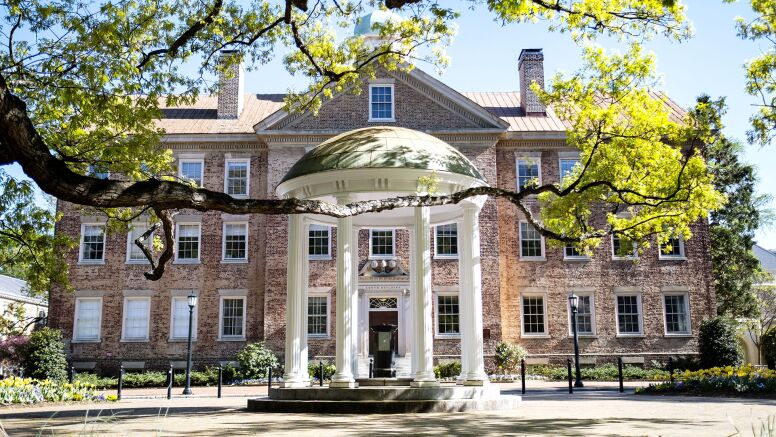News & Stories
UNC commission to study and honor the enslaved people buried at Barbee Cemetery

The University Commission on History, Race, and a Way Forward and UNC Kenan-Flagler Business School at the University of North Carolina at Chapel Hill are working together to honor the approximately 100 enslaved people buried in Barbee Cemetery at the Rizzo Center in Meadowmont.
“One of the commission’s overarching concerns is to change the way that the story of slavery is told and reaffirm the humanity of the people held in bondage. The Barbees and the people they enslaved played an important role in the early history of the University and greater community,” said Jim Leloudis, commission co-chair, professor of history and Peter T. Grauer Associate Dean for Honors Carolina.
“UNC Kenan-Flagler came to us with their concerns and wish to properly acknowledge the graves and lives of the enslaved people buried in Barbee Cemetery,” said Leloudis. “We appreciate the Business School’s leadership on this project. It’s important to the University and the local community, most especially to people who are descendants of those enslaved on the Barbee farm. It will make an invaluable contribution to our broad institutional reckoning and healing.”
The commission asked UNC Kenan-Flagler to delay updating existing cemetery markers until research could be done about the enslaved people on the Barbee farm and the world they created there, which helped shape southern Orange County.
“Appropriately recognizing and honoring the enslaved people buried in Barbee Cemetery is of great importance to the UNC Kenan-Flagler community, and while we feel an urgency to address it, we value the significance of the work of the University Commission on History, Race, and a Way Forward and their thoughtful, historical approach to understanding and sharing the stories of the people buried there,” said Doug Shackelford, dean of UNC Kenan-Flagler.
“The History, Race, and a Way Forward Commission is doing critical work to tell the truthful stories of our University’s past and to ensure that underrepresented voices are always heard,” said Kevin M. Guskiewicz. “The Barbee Cemetery Project is part of our university’s story, and I am grateful to the Commission and to UNC Kenan-Flagler Business School for their partnership. Through our strategic plan, Carolina Next: Innovations for Public Good, we are committed to the work of building our community together and this project is one of many important steps we are taking to reckon with our history.”
“The Barbee Cemetery project is vital as we explore, engage and teach UNC’s history with race, and provide recommendations to the Chancellor on how we as a University community must reckon with the past,” said Patricia Parker, commission co-chair, professor and chair of the Department of Communication, and director of the Graduate Certificate for Participatory Research.
“We are recovering the lost stories about our history and bringing new voices to tell those stories. We believe our process will help us heal, repair, reconcile and build relationships that will sustain an equitable and just society.”
Critical to conducting this project is developing a community advisory board to provide insight and inform the direction of this project. Members of this community advisory board include Black descendants of the Barbee family and other local community members representing organizations such as the NAACP and the Orange County Community Remembrance Coalition.
“The Barbee heirs are partnering with UNC-Chapel Hill’s Commission on History, Race, and a Way Forward and the UNC Kenan-Flagler Business School because we share their commitment to bringing light to the local histories and contributions of Black community members,” said Lorie Clark, Barbee heir. “Often people impacted are excluded from processes and decisions. This partnership allows us to include our stories and honor our ancestors.”
The process includes:
- Collaborating with community and campus partners to research the history of the people enslaved by the Barbee family and the history of their descendants.
- Making recommendations to appropriately acknowledge and teach that history.
- Partnering with UNC Kenan-Flagler and UNC Facilities to develop appropriate signage and a curatorial plan for the Barbee cemetery
- Making recommendations for appropriate care and upkeep of the cemetery
- Identifying and assessing other University-related sites that require similar attention
Leading the Barbee Cemetery project are commission members Dawna Jones, assistant dean of students of and chair of the Carolina Black Caucus, and Seth Kotch, associate professor in the Department of American Studies and director of the Southern Oral History Program. They plan to:
- Collect information about the cemetery and about the history of race in Chapel Hill and Carrboro and at UNC and present it in a clear, accessible fashion off and on campus.
- Study effective commemoration efforts and create a process, in consultation with community partners, to commemorate the lives of the enslaved people buried in the cemetery through a recurring remembrance ceremony which could serve as a blueprint for similar events at other burial sites.
- Conduct an oral history project with white and Black descendants of the Barbee and Hargrave families, other Black residents of Chapel Hill and Carrboro, and University staff. They will archive the interviews at UNC and stage them at various spaces in town.
- Make recommendations in support of a commitment by UNC and UNC Kenan-Flagler to mark and maintain the cemetery properly to include signage, accessible pathways and grave markers as well as acknowledge and reckon with the history of this land.
- Make recommendations for a commitment by UNC to address its deep relationship with slavery by considering redistribution of campus resources to substantive programs that promote equity on and off campus.